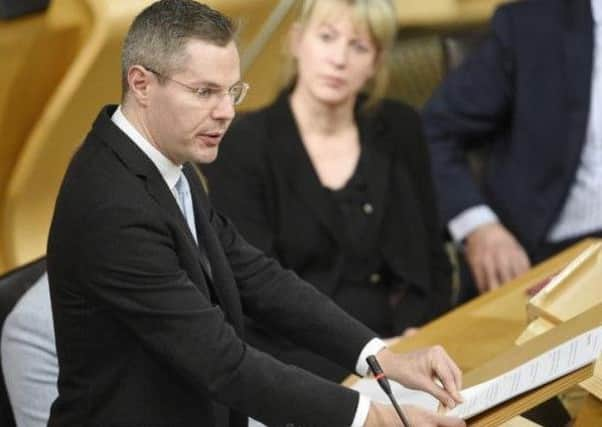Ian Swanson: Holyrood grows up with a tax fiddle


The budget for 2017/18, passed at Holyrood last week, was historic – not because of some dramatic, ground-breaking measure announced by Finance Secretary Derek Mackay, but because, for the first time, the parliament had power over the rates, bands and thresholds of income tax north of the border.
So after nearly 18 years of devolution, how is Holyrood matching up to the new responsibilities of adulthood?
Advertisement
Hide AdAdvertisement
Hide AdEver since the parliament was set up in 1999 it has had the power to vary the basic rate of income tax up or down by 3p. Although the SNP proposed a ‘penny for Scotland’ in that first election, the tax power was widely seen as a blunt instrument and was never used then or since.
Many believed that, even with the much wider powers which now exist, there would be no appetite among Scottish politicians for choosing a different tax regime from England.
The SNP almost proved them right. Mr Mackay’s original proposal did involve using the new powers – but almost to the minimum extent possible, raising the threshold for 40p taxpayers only by inflation rather than the more generous rise being implemented south of the border.
Labour, the Liberal Democrats and the Greens all urged him to go much further. Labour argued for a 1p rise in income tax and the return of the 50p top rate for those on over £150,000. The Greens wanted a top rate of 60p.
Advertisement
Hide AdAdvertisement
Hide AdAlthough the SNP needed the support – or abstention – of at least one other party to get this year’s budget through, it seemed unlikely there would be any concessions on such a politically-sensitive issue as tax.
In the end, it was the six Green MSPs who sided with the Nationalists and allowed the budget to pass.
They didn’t manage to convert Mr Mackay to a 60p top rate, but they did get him to make a small concession on tax. Now the threshold for the 40p rate will be frozen at £43,000 rather than go up by inflation to £43,430.
It will have limited impact – either in terms of its effect on the taxpayers concerned or the revenue it raises. But symbolically it is important. Scotland is making a different decision on income tax for the first time.
Advertisement
Hide AdAdvertisement
Hide AdLabour and the Lib Dems claim the Greens’ deal with the government means they are aiding and abetting the SNP in passing on Tory cuts.
But no budget deal was going to stop these altogether. And the Greens can take credit for pushing the SNP into giving councils £160 million more than they planned to – which, in Edinburgh’s case, could mean saving libraries from having their opening hours cut.
The last time the SNP was in minority government it was the Tories who usually rode to the rescue on budget votes. But they had a different view this time, complaining the failure to increase the threshold in line with England was making Scotland “the highest-taxed part of the UK” and hinting they might lower tax instead.
Holyrood’s new tax powers are here to stay and there is plenty of scope to argue about new policy approaches.
Advertisement
Hide AdAdvertisement
Hide AdPerhaps future years will see bigger tax debates with bolder ideas about taking a more radically different path from Westminster and varying taxes more substantially – up or down.